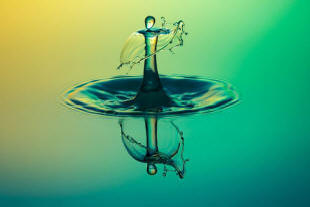Describing words: adjectives
READ FIRST: Before you do this, read the part of the grammar about nouns. If you don't read that, you will not understand this.
Examples on this page in red are wrong!
 |
The red tomatoes are deliciousAdjectives tell us about nouns |
 |
Adjective first, noun second
The red tomatoes |
Here, we have two adjectives:
red and
delicious.
Both the adjectives come before the noun. Here are some more
examples:
The blue sea
The delicious food
The old car
The new house
The happy man
The beautiful churches
The wonderful news
Most adjectives in English can do that.
In English, adjectives do not change for singular and plural nouns.
Do they change in your language?
When the adjective comes before the noun, it is called an
attributive adjective. In English nearly all
attributive adjectives come before the noun. Where do they
come in your language? Before or after? Do you say:
The interesting book
or
The book interesting?
 |
Noun first, Adjective second
The tomatoes are red |
When the adjective comes after the noun, it is called a predicative adjective.
We must connect the noun and the adjective with a linking verb. Here are some examples. The adjective is in black and the linking verb is in green.
The tomatoes tasted
good
The car was
old
The house seems
empty
The dog smells
terrible
The man appears
stupid
He grew
tired
He's getting
old
The milk went
sour
I feel
ill
It looks
lovely
That sounds
nice
 |
There are some more linking verbs in English but they all do
the same thing: they join the subject to the adjective. |
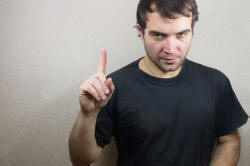 |
Noticing adjectives |
You do not usually know if a word is an adjective just by looking at it but sometimes you can. Look at the ending of the word. For example:
- words ending in -able or -ible are usually adjectives:
- countable, comfortable, thinkable, edible, horrible, flexible etc.
- words ending in -ish or -like are usually adjectives:
- childish, foolish, childlike etc.
- words ending in -ful and -less are usually adjectives:
- hopeful, childless, homeless, wonderful etc.
- words ending in -ous are usually adjectives:
- delicious, obvious, dangerous etc.
- words ending in -y are often adjectives:
- pretty, dirty, happy, tidy, woody etc.
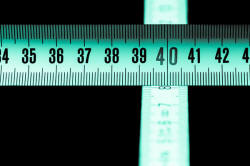 |
Grading adjectives |
Most adjectives can be made stronger by putting very,
extremely, a lot, greatly etc. in front of them.
Most adjectives can also be made weaker by putting slightly, a
bit, a little, somewhat etc. in front to them.
So we can say, for example:
John is a little angry
Mary is very old
It's an extremely expensive car
It's a somewhat dirty house
These adjectives are gradable.
With other adjectives, we cannot use very or any of the other words. There are four types of non-gradable adjectives:
- Absolute adjectives
-
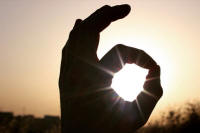
These are adjectives like unique and perfect which cannot be made stronger or weaker. You cannot say, for example:
it's extremely perfect
or
a slightly unique man
or
a very complete book - Yes-No adjectives
-
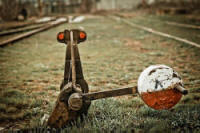
These adjectives are either 100% or 0%. For example:
A door is either open or closed. A door cannot be very open or slightly closed.
A person is either dead or alive
and so on.
This is the same in most languages, of course. - Top and bottom adjectives
-

These adjectives are already at the top or the bottom of the scale and can go no further. For example:
freezing is the coldest so we can't say very freezing and boiling is the hottest so we can't say very boiling
wonderful and awful are the best and worst so we can't say very wonderful or very awful. - Class adjectives
-
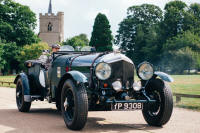
Some adjectives tell you what type of noun it is and we can't use very with these. We can say, for example:
a very old car but not a very vintage car
a very young boy but not a very teenage boy
a very fast computer but not a very digital computer
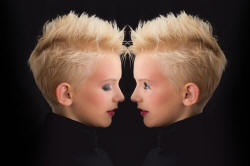 |
Comparing adjectives |
Many adjectives come in three forms:
- The base (or positive) form:
small, light, dark, interesting, beautiful, wet etc. - The comparative form:
smaller, lighter, darker, more interesting, more beautiful, wetter etc. - The superlative form:
the smallest, the lightest, the darkest, the most interesting, the most beautiful, the wettest etc.
Here are the easy rules for what we do to make these forms. It depends on the form of the base adjective.
- One-syllable adjectives and two syllable adjectives ending in -y, -er, -le, -ow:
- Make the comparative with -er and the superlative
with -est. For example:
kind-kinder-kindest
big-bigger-biggest (double the consonant after a short vowel)
dry-drier-driest (change the y to i)
pretty-prettier-prettiest
clever-cleverer-cleverest
simple-simpler-simplest
yellow-yellower-yellowest
But: if the adjective comes from a verb and ends in -ed or -ing (e.g., bored, boring, tired, tiring, worried, worrying, pleased, pleasing) use more and most: more/most bored, most tired/most tiring etc. - Two-syllable adjectives not in the list above and three-syllable (and more) adjectives
- Make the comparative more and the superlative with
most:
beautiful-more beautiful-most beautiful
intelligent-more intelligent-most intelligent
frequent-more frequent-most frequent
pleasant-more pleasant-most pleasant
content-more content-most content
helpful-more helpful-most helpful
childish-more childish-most childish
hopeless-more hopeless-most hopeless
modern-more modern-most modern
basic-more basic-most basic - Irregular words:
- good-better-best
far-further/farther-furthest/farthest
little-less-least
more-most
 |
The a- adjectives |
There are a number of adjectives in English called the a-series
and they are a little different. The most common ones are
asleep, alive, afraid, alike, awake, aware.
These adjectives:
- never come before the
noun
the man is asleep but not the asleep man
the baby is awake but not the awake baby
the girl seems afraid but not the afraid girl - always make comparative
and superlative forms with more and most
more afraid, most aware not afraider or awarest
(Adjectives like alive and asleep are not gradable, of course.)
 |
Ordering adjectives |
In some grammar books, you will find complicated rules for
ordering adjectives in English. This is a simple grammar, so
we have a simple rule. Our examples are:
The pretty, blue, glass, perfume bottle
The interesting, old, French, sailing boat
The horrible, noisy, English, racing car
and in these we have 4 adjectives. How do we
decide which one comes first? Here is the way, starting from
the noun and working backwards.
- Classifiers like, sailing, racing and perfume tells us the type of bottle, boat or car and go next to the noun.
- Adjectives which are ungradable (i.e., cannot be more or less) come next. The examples here are glass, French and English. Something is either glass or it isn't. Often these tell us the material something is made of or where it comes from.
- Adjectives which are gradable but not my opinion come next. The examples here are blue, old and noisy. If something is blue, it's blue and it doesn't matter what I think.
- Adjectives which are just my opinion come furthest from the noun. The examples here are pretty, interesting and horrible. I can think something is pretty but perhaps you think it is ugly.
It looks like this with another example:
| Some lovely, new, leather, walking shoes | |
|
|
+ noun |
 |
 |
Adjectives from verbs |
We can make two types of adjectives from verbs in English (and we do it a lot).
- -ed adjectives such as
- interested, bored, frightened,
excited, terrified
These adjectives say how someone or something feels - -ing adjectives such as
- interesting, boring, frightening,
exciting, terrifying
These adjectives say how something makes you (or something else) feel
Here are some examples using the pictures of the cat and the mouse:
So ...
| do not say | but do say |
| The film is bored | The film is boring |
| I am boring by the film | I am bored by the film |
| I am interesting by the book | I am interested by the book |
| The music is excited | The music is exciting |
Notice, too, that all adjectives formed from verbs like this take more and most to form comparative and superlative forms. You can never say boringer, exciteder etc.
